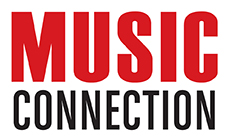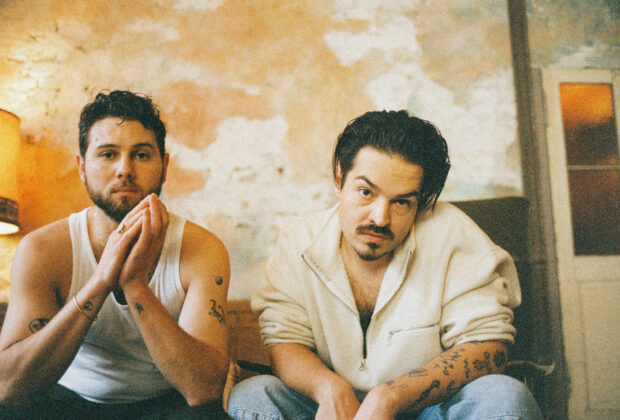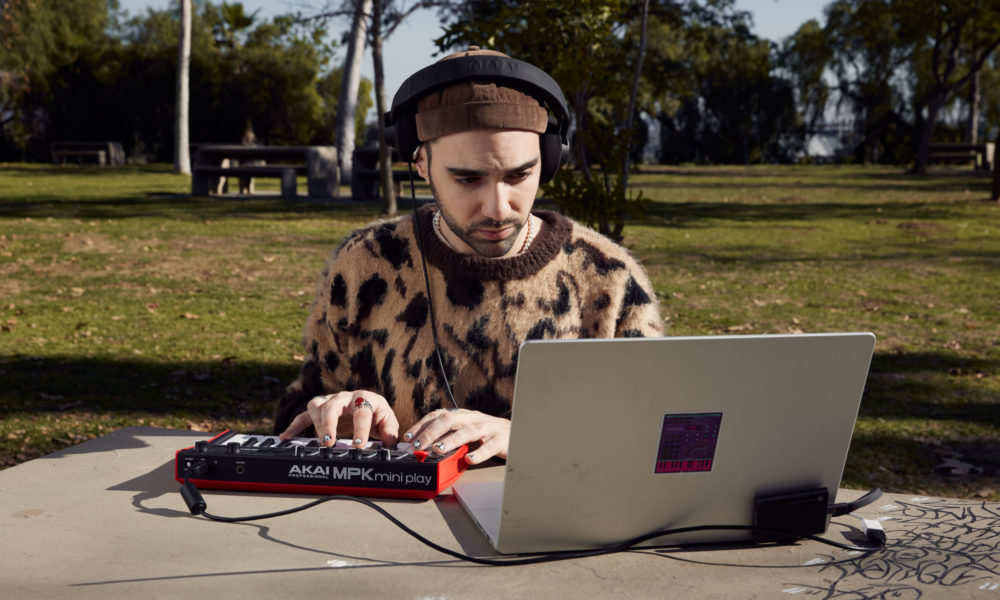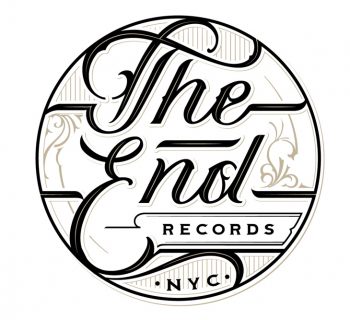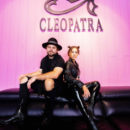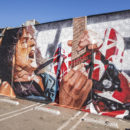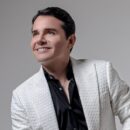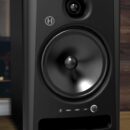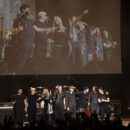The story behind how the spotlight fell on Milky Chance is as unique as the duo’s music itself. First meeting at school in Kassel, Germany, the pair got along like Pilsner and schnitzel. Clemens Rehbein (vocals, guitars) and Philipp Dausch (percussion, bass) soon became members of jazz quintet Flown Tones. After that outfit called it quits, Rehbein and Dausch decided their artistic chemistry merited further exploration.
Just for fun, the two began recording songs independently. They eventually uploaded their creations onto YouTube and SoundCloud, where the unknown players developed an instant and unexpected following. This development was particularly surprising considering the act’s left-of-center creative perspective. Incorporating elements of disparate genres such as electronica, folk, and reggae into their sound, Milky Chance’s concoctions are as confounding as they are catchy and effervescent. Their video for first single “Stolen Dance” subsequently earned millions of views and garnered accolades from the press. The song topped the charts throughout Europe during 2013.
Fast forward to today. The unlikely stars continue to rack up listens on Spotify. Their fame stretches around the globe, from the European Union to Mexico, Australia and beyond. By way of expanding their sound, Rehbein and Dausch added Antonio Greger and Sebastian Schmidt to the mix. Happily, these new additions are also friends from the same school where they met.
Milky Chance just released a fourth album, Living In a Haze. Featuring guest appearances by Canadian vocalist Charlotte Cardin and Malian musician Fatoumata Diawara, the disc is brimming with idiosyncratic lyrics over gently burbling beats that are both strange and oddly familiar. Every track works its way slowly into your subconscious. Like a lightning bolt from out of nowhere, there comes the sudden realization you’re hooked.
Lead singer Rehbein opened up with Music Connection at the start of the band’s most ambitious tour ever. The moment was also shortly before the new disc dropped, infusing the chat with undeniable electricity. Throughout the conversation, Rehbein’s amiable personality shone through, and his candid demeanor shed light on exactly what it means to spearhead a musical phenomenon the entire globe is clamoring over.
Music Connection: Congratulations on the release of your new album. You must be excited for people to hear it. Does it ever get less thrilling? What’s different about releasing an album this time around?
Clemens Rehbein: We know the situation, because it is our fourth album. But we still have the thrill. It’s always exciting to share new music with people. Every album means a lot to us and so does this one. It’s always lovely to see the fans’ reactions to new music. That always makes us really happy and grateful.
MC: Were you surprised by the positive reaction you got early in your career, especially from the press?
Rehbein: During that time, a lot of things happened. It was only years later that we realized what really happened and what all that means. In the early years, we were overwhelmed from time to time. It’s easier in retrospect to understand what happened to us, you know?
MC: It’s got to take a bit of adjusting.
Rehbein:Yeah, definitely. It was kind of crazy, because in the beginning we didn’t have any vision or ideas of being a band. We were just recording these songs for fun. It got big very quick, so we had to grow with it. But right now, we feel like we are in a good state. Over the years, we went our path and found our identity as a band.

MC:As Germans, why did you decide to sing in English?
Rehbein: That wasn’t even a decision, actually. I think mainly it was because 95% of the music we listened to was English. When you listen to English music and songs, you learn what people say, how you can say things in songs and all that. It’s the same with language. If you’re surrounded by Spanish, you’ll probably learn to speak Spanish.
But also, I felt like it’s easier to write in English. It sounds way better. German is a tough language to write lyrics, even poetry. It sounds harsh sometimes. English is way more soft. It’s probably one of the most used languages in music. That was just the way to do it for us. It felt natural somehow.
MC: English lyrics are probably more marketable than German lyrics.
Rehbein: Of course. It makes it way easier.
MC: When you write, do you start with lyrics or beats? And how do you bring them together?
Rehbein: It can change from song to song, but mainly we start with the music. Then, the lyrics come right with it. Most of the time when we meet in the studio, we either have an idea of something, whether it’s a chord progression, a rhythm, a melody or something like that. And then we start jamming a bit. When we’re trying to find melodies and all that, we start mumbling. Not actual words, but then there’s words coming. And within that process, you maybe find one line or sentence and go from there.
Then it all happens at the same time. Sometimes, we build a beat. We play with the guitar while singing some fancy words and the lyrics come out. With one song on the new album, “Golden,” Philipp had a lyric, so we started with that. But then also we went from there and started with the music right away.
MC: When you’re writing, do you think about synchronization possibilities? Can you write a song to get placed in a movie or a commercial?
Rehbein: I don’t think so. We never have anything in mind except the music itself. We’re driven by being in the moment. We work intuitively, so whatever comes out, whatever feels right, is what we go for. We never go into the studio and say, “Maybe we should write a song about this and it should sound like that.” We just see what takes us.
MC: Your music has all kinds of influences. One that people often mention is reggae. Do you agree that’s part of your musical DNA?
Rehbein: That’s definitely one part of our DNA. We love to listen to reggae music. Right now, I’m listening to lots of roots reggae, like in the last few weeks. Not more than other genres, I would say. We just love music in general. We listen to so many different kinds of music and love getting inspired by it. I think that’s what music is about. We never felt like going in just one direction. There is so much out there, and you want to let it in and do something with that. And I think that’s beautiful. There are so many genres coming from different countries. It connects us in a good way. So, we’re influenced by many different styles. But also reggae.
MC: What would you classify your music as?
Rehbein: We would probably never put it anywhere. Genres help to describe a little bit, to get an idea of it. But also nowadays, I feel like genres are not as clear and strong as back in the day. Boundaries are really fading, in a positive way. I love that.
It is like a mixture between analog and digital music. That’s what we always say. It’s influenced by many genres, like folk music, singer-songwriter and reggae music, music that you don’t program. But we’re also deeply influenced by electronic music and all that. And we’re always trying to merge that together somehow. We love that, moving between analog and digital.
It’s also something that we’re coming from, because the internet came up when we were 10 or something. We were born in more of an analog century and then moved into the new digital age. And we feel at home with both of these. I think you can hear that in our music.
MC: Yeah, genres should be mixed. How did the pandemic affect the band? It didn’t seem to slow you down any. You recorded plenty during that time.
Rehbein: For us, it actually was good somehow. Talking from a privileged position, we didn’t have any financial struggles or anything like that. That is very lucky. And we kind of took a break that we probably wouldn’t have taken. Creatively, it was good for us, because we had time to calm down and go to the studio daily. We really dived into the creative process and creating music. Without having any schedule or touring plans felt freeing for us. That was helpful, to be creative and try new things. It brought us to where we are now.
MC: What about virtual reality? Are you interested in using that? Are there other ways you want to use technology to enhance the Milky Chance experience?
Rehbein: That’s an interesting question. I’m not that into VR. Our music is influenced by studio technology. But besides that, we are very analog dudes. We love doing things with our hands, like craftsmanship. Of course, we do socials and stuff like that, but we’re not very much into [technology].
MC: Have you been following what’s going on with AI? Do you worry about that?
Rehbein: We’ve discussed that a lot within the band. We’ve had several discussions about AI technology and how it will or can change society in ways we don’t even know about yet or that we cannot imagine right now. I think there are going to be potentially so many jobs replaced by AI. It feels like there will be such a big step in that technology that we, as human beings, really have to roll with it. Everybody’s trying out what AI can do. To me, it is frightening and also mind-blowing. It will open a lot of discussions on many levels, social and ethical. What do you think about it?
MC: I think it has a place in creativity. Art that’s created by AI is just as legitimate as art created by humans. But it’s going to create confusion to where nobody knows what’s real anymore.
Rehbein: It’s a dangerous thing. If you look back in history, people have always used inventions in the wrong way. And I think you can use AI as a weapon on many levels. That frightens me. It’s more about how people deal with it, not the technology itself. Because you could do great things with it, really use it as a tool to fix things. But this is not how the world is, unfortunately. There will be people misusing it, probably.
MC: Tell us about your Milky Change initiative. How are you working to create less of a carbon footprint?
Rehbein: It’s not only about reducing our footprint, which is hard to do on tour. That is something we had to learn. First, it’s about putting the topic on the agenda and having a dialogue with other people working in the environmental area. For us, it’s just using our platform to inform about the issues. And of course, we’re trying to make steps, but we also limit it in a way, especially when we’re talking about going on tour. But we’re trying to do better and do things differently. It’s all about making progress.
MC: You’ve got someone spearheading your strategy for being environmentally conscious.
Rehbein: Yeah, it was the end of 2019 when we hired a new member on our team. Since then, she’s been our sustainability manager. In the beginning, it was a lot of analyzing. Like, if we want to reduce our footprint, first we have to know how it works. If we look at one show, what is creating the footprint? The fan travel, our travel, the power supply of the venue... So that was interesting. It was really digging deep into numbers and all of that. And learning from that, trying to adjust where we can.
It’s not easy, especially when you’re touring internationally. There’s no other way to travel than by plane. And there’s no sustainable way of flying. You can buy carbon offsets. That’s a little step, but of course it doesn’t make the carbon footprint better.

MC: What can artists do to make themselves more environmentally conscious?
Rehbein: The most important thing is to speak about it. That’s also something we do. Every artist has its tour rider and we created our green rider. It says no plastic back stage, local organic catering, all that. Also, reaching out to the venues. If they supply electricity, where is it from? Is it a sustainable source, green electricity and all that? Venues probably will not change that fast, but if more and more artists demand it kindly, the whole touring industry will start thinking about it.
We feel like we just joined a community, because we’re not pioneers. There are artists that have been around for 20 years being environmental activists, using their reach and platforms to talk about it. And I think the more we artists do that, we put more and more attention to it. There’s less time [than ever before] to make big steps and we need politics to do that, otherwise it will take forever. So, the most important thing is to speak about it, build a big discussion and amplify.
MC: How do you stay fit on the road? What’s your strategy for staying healthy?
Rehbein: Trying to eat healthy is important. Take a walk outside. Do sports or yoga. Take care of your body, which also is important for your mental health. We’re lucky, because we all know each other from high school. We’re close friends. So, if someone’s not feeling good, we can talk about it. Whatever it is, we talk about it. We have a safe space for us and help each other.
Also, we’ve known our crew for years, so it really is like a big family. It’s very intimate and we’re all close. We know each other well. We’re in this together. We’re like a community and help each other out if things are not easy. I think that also is a big part of it.
MC: Are there times when you get on each other’s nerves during a long tour? How do you work that out?
Rehbein: Not dramatically. If someone needs some space, we all feel that. You can always take a walk or do stuff on your own. I think that’s the way to do it. We never fight or anything. We get along well.
MC: What’s your advice to younger musicians?
Rehbein: We don’t like giving advice because, though we’re all aiming at the same target, there are individual ways to get there. Sometimes, this feels right for this person. And that is the right thing to do for this person. But for the other person, maybe, it is totally the opposite. There’s not only one way. For example, being successful. What is success? For some people, success means something different than for others.
So, giving advice is hard. But for us, it has always been important to trust our intuition, especially when we make music. The music that we do has to feel good. It has to feel right. It has to be the music that we want to do. We have to feel comfortable with it.
Music has been our passion and still is. Creating and making music gives us a good feeling and we always try to keep in that space. Of course, there are people on the outside having opinions and all that. Critics and hearing other people’s opinions can be helpful sometimes. But also trust yourself.
MC: What’s it like trying to break an American audience?
Rehbein: It just happened to us. We were never like, “We want to tour in the U.S. one day.” It was more like, at the end of 2014, we got so much attention that came to us and we just took the opportunity.
Contact Rachel Jacobs - Shore Fire Media, [email protected]; James Rainis - Shore Fire Media, [email protected]; Milkychance.net

